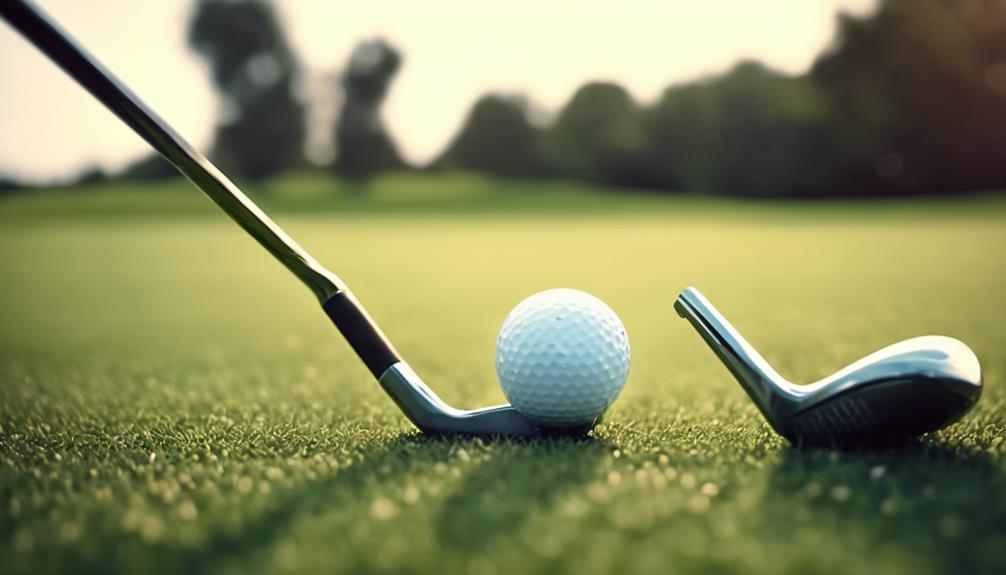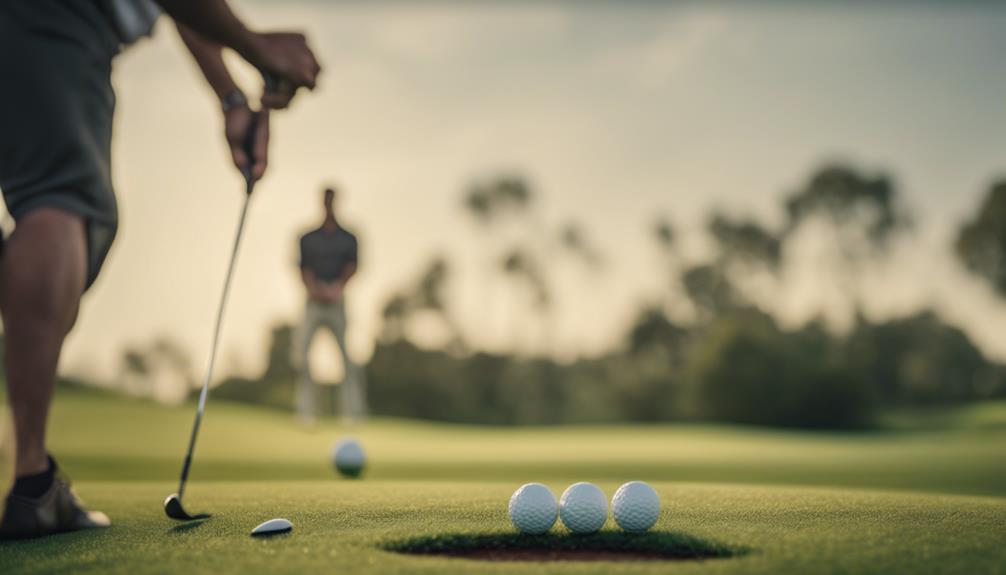- 7 Top Flite Golf Clubs XL for Improved Performance - September 28, 2024
- Top Flite Golf Clubs: Top 5 Reasons to Choose Them - September 28, 2024
- Top 3 Golf Club Fitters for a Perfect Swing - September 28, 2024
When practicing your golf swing, using the right clubs can make all the difference. As a beginner, start with a smaller set of eight clubs, including a driver, putter, and irons, to build essential skills. If you're struggling with slicing, try clubs with more forgiveness and accuracy, like hybrids and pitching wedges. For control and precision, focus on clubs with advanced technologies, such as weighted club heads and pinpoint face technology. Practice with a 7-iron to develop a balanced swing profile, and experiment with different clubs to find what works best for you. Continue refining your technique with the right clubs, and you'll see significant improvements in your game.
Key Takeaways
- Forgiving clubs like the Cleveland Launcher HB iron help beginners develop essential skills and build confidence in their swing.
- A 7-iron is ideal for practice, allowing focus on clubface control, building tempo, and timing, and improving overall swing consistency.
- Hybrids like those from TaylorMade, Callaway, and Cobra offer a more forgiving and accurate alternative to traditional long irons for shots between 150-220 yards.
- Practicing with wedges, including the pitching wedge, gap wedge, sand wedge, and lob wedge, is essential for short game improvement and developing precision and control.
- Weighted club heads with advanced technologies like Pinpoint Face Technology and SPEEDBACK technology promote a balanced swing profile, increasing accuracy and distance control.
Clubs for Beginners to Start
When starting out, you'll want to focus on building a solid foundation with forgiving clubs that help you develop essential skills and improve your game over time.
As a beginner, you don't need a complete set of golf clubs to get started. You can begin with a smaller set of eight clubs, including a driver, putter, and irons, and then add more clubs as your game improves.
A complete club set-up for beginners typically includes one driver, one putter, three wedges, seven irons, and either woods or hybrids, with hybrids being more forgiving and a good option.
Understanding the distance and performance of each club is essential, and practicing on the driving range helps determine which clubs to use and when, building confidence and muscle memory for club selection.
Focus on developing your short game with wedges and putters, and don't be afraid to experiment with different clubs to find what works best for you.
With the right clubs and practice, you'll be well on your way to mastering the game.
Forgiving Clubs for Slicing
If you're struggling with slicing, you'll want to reach for clubs that offer more forgiveness and accuracy, particularly when hitting straight shots off the tee or from the fairway.
The 7-iron is a great option, with a larger sweet spot and more loft than drivers, making it easier to hit straight shots.
Hybrids are also a good choice, combining the distance of drivers with the accuracy of irons and often proving more consistent than long irons.
When it comes to short game shots, the pitching wedge is a forgiving club for slicing, with its high loft angle and large sweet spot making it easier to hit high, straight shots.
If you're struggling with long irons, try the 4-iron, which has a slightly higher loft angle and a larger sweet spot than the 3-iron, making it more forgiving for slicers.
Additionally, consider the Cleveland Launcher HB iron, designed specifically for forgiveness and consistency.
Control-Focused Clubs for Precision

When you're looking to hone your precision, you'll want to focus on control-focused clubs that offer advanced technologies to help you refine your game.
You'll benefit from clubs featuring Pinpoint Face Technology, which guarantees a consistent strike, and Weighted Club Heads that promote a Balanced Swing Profile.
Pinpoint Face Technology
With Pinpoint Face Technology, you can expect a dramatic improvement in your shot accuracy, thanks to a smaller, more consistent sweet spot on the clubface that reduces the impact of mishits.
This technology is particularly useful for golfers who struggle with inconsistent ball-striking, as it helps to improve overall accuracy.
When choosing a club to use, consider one with Pinpoint Face Technology, such as the TaylorMade P770 or the Callaway Apex 19. These golf clubs feature a smaller clubhead size, making them more forgiving and easier to control.
When taking a full swing, the technology works by creating a more uniform distribution of weight across the clubface, allowing for a more consistent transfer of energy from the club to the ball.
This results in more precise shots and better overall performance.
Weighted Club Heads
Weighted club heads, a key feature of control-focused clubs, can greatly enhance your precision by increasing the moment of inertia, which in turn reduces twisting and rotation during the swing, resulting in more consistent ball-striking.
The added weight in the club head, typically between 10-20 grams, allows you to develop a smoother, more controlled tempo, leading to improved accuracy and distance control.
This is particularly beneficial for golfers with faster swing speeds, as it helps to reduce the likelihood of slicing or hooking the ball.
By slowing down the club head speed, weighted club heads enable you to make more consistent contact, resulting in fewer mishits and improved overall performance.
When taking full shots with mid irons, the increased weight in the club head helps to promote a more centered strike, reducing the impact of off-center hits and resulting in more consistent distance and direction.
With weighted club heads, you'll experience improved distance control and precision, allowing you to take your game to the next level.
Balanced Swing Profile
Practicing with a 7-iron is an ideal way to develop a balanced swing profile, as its moderate distance and forgiving nature allow you to focus on precision and control.
This club is perfect for warm-ups, helping you feel the clubhead in your hands and calibrate your shots before teeing off.
As you swing, you'll establish a comfortable feel and tempo, leading to a more consistent swing and improved overall game.
Three benefits of practicing with a 7-iron are:
- Improved clubface control: Warming up with a 7-iron allows you to work on clubface control, essential for hitting accurate shots and building confidence.
- Controlled turf interaction: The slower swings with a 7-iron help you focus on turf interaction with each swing, promoting a more controlled and precise strike.
- Consistent swing tempo: Practicing with a 7-iron helps you develop a consistent swing tempo, leading to a more balanced swing profile and improved overall performance.
Best Drivers for Practice Sessions
When you're practicing your drive, you want to focus on building clubhead speed and consistency.
To do this, you'll benefit from drivers with forgiving face designs that can help you achieve a more consistent ball flight.
Clubhead Speed Focus
Optimizing your clubhead speed is essential for improving your overall driving performance, and selecting the right driver for practice sessions can greatly accelerate your progress. When choosing a driver, look for one that's designed to help you achieve faster clubhead speeds and longer drives.
TaylorMade M6 Driver: With its large sweet spot and forgiving design, this driver is perfect for practice sessions. It helps you improve your clubhead speed and accuracy, making it an excellent choice for golfers of all skill levels.
Callaway Golf Epic Flash Driver: This driver features a unique Flash Face design that increases ball speed and distance, making it ideal for golfers looking to boost their clubhead speed.
Cobra Golf F9 Men's Driver: The SPEEDBACK technology in this driver provides a more efficient transfer of energy from the clubhead to the ball, resulting in faster clubhead speeds and longer drives.
Forgiving Face Design
You'll want to focus on drivers with forgiving face designs when selecting a club for practice sessions, as they can significantly improve your accuracy and consistency.
A forgiving face design guarantees that even off-center hits result in solid shots, allowing you to focus on refining your technique without getting discouraged by wayward golf balls.
When choosing a driver for your set of clubs, consider the TaylorMade SIM Max, Callaway Mavrik Max, Ping G410 Plus, Cobra F9 Men's, or Wilson Staff D7.
Each of these drivers boasts a large, forgiving face that will help you hit balls straighter and farther.
The TaylorMade SIM Max features a large sweet spot, while the Callaway Mavrik Max has a high MOI design for added stability.
The Ping G410 Plus reduces spin and increases ball speed, and the Cobra F9 Men's and Wilson Staff D7 drivers offer E9 Technology and a large sweet spot, respectively, to enhance your practice sessions.
With a forgiving face design, you'll be able to practice with confidence, honing your skills and preparing yourself for a successful round.
Irons for Consistent Swing

By incorporating the 7-iron into your practice routine, you'll be able to calibrate your swing and develop a consistent tempo that translates to improved performance with all your irons.
This club is ideal for practice because it allows you to focus on clubface control, which is essential for hitting accurate shots. With a 7-iron, you'll be able to warm up your full range of motion, feel the clubhead in your hands, and focus on turf interaction with each swing, making it an effective way to build tempo and timing.
Improved tempo and timing: The 7-iron helps you develop a consistent swing tempo, which is essential for hitting accurate shots.
Forgiving club: The 7-iron is more forgiving than other clubs, making it easier to hit good shots, even when you're still warming up.
Better short shots: With a 7-iron, you'll be able to hit more accurate short shots, which is vital for improving your overall golf game.
Wedges for Short Game Improvement
Mastering wedges – specifically the pitching wedge, gap wedge, sand wedge, and lob wedge – is essential for short game improvement, as these clubs enable you to hit high-arc shots with precision and control.
To take your short game to the next level, practice with these wedges at the driving range. You'll develop a consistent swing tempo, improve your ability to hit shots with varying distances, and build confidence in your short game.
The pitching wedge is the most versatile wedge, ideal for practicing full swings, chipping, and pitching. It's perfect for shots between 100-125 yards.
The gap wedge, used for shots between 80-100 yards, helps you fill the distance gap between the pitching wedge and sand wedge, and is essential for developing a smooth, controlled swing.
Hybrids for Long-Range Shots

As you move beyond the short game and focus on long-range shots, hybrids become a vital addition to your club selection, offering a more forgiving and accurate alternative to traditional long irons. With their larger sweet spot and more forgiving clubface, hybrids provide a higher trajectory and more accuracy than traditional long irons, making them an ideal choice for shots between 150-220 yards.
Three key benefits of adding hybrids to your golf bag:
- Increased accuracy: Hybrids are designed to provide a more consistent and reliable option for long-range shots, reducing the risk of slicing or hooking.
- Improved forgiveness: With a larger sweet spot, hybrids are more forgiving than long irons, allowing for a greater margin of error on approach shots.
- Enhanced versatility: Hybrids can be hit from a variety of lies, including uneven terrain and sand traps, making them a valuable addition to your golf bag.
Putters for Accurate Putting
When it comes to sinking putts consistently, a well-chosen putter can make all the difference, and understanding the key characteristics of a good putter is essential for making accurate shots on the green. As you practice your swing, you'll want a putter that provides a consistent roll, proper alignment, and the right amount of weight. Popular putter types include blade, mallet, and hybrids, each with its own strengths and weaknesses.
| Putter Type | Key Features | Best For |
|---|---|---|
| Blade | Precise alignment, better feel | Skilled golfers seeking control |
| Mallet | Forgiving design, larger sweet spot | Beginners building confidence |
| Hybrid | Combination of blade and mallet features | Golfers seeking a balance |
When choosing a putter, consider factors such as face insert material, grip style, and shaft material, as well as your personal preference for weight, balance, and feel. Some putters are designed with specific features to help with alignment, such as lines or markings on the face, while others have adjustable weights to customize the feel. With the right putter, you'll be able to make every shot on the putting green with confidence, from short pitch shots to longer carry distances.
Specialty Clubs for Fine-Tuning

To fine-tune your overall game, incorporating specialty clubs into your practice routine can help you develop a more consistent swing, improve your short game, and enhance your control around the green.
Using the right clubs can make all the difference in your practice sessions.
- 7-iron: Ideal for warm-up and calibrating your shots, this club helps build confidence and focus on turf interaction.
- Pitching wedge: Improve your tempo and smooth swing with this essential club for fine-tuning short game skills.
- 56-degree Vokey wedge: With its versatility and forgiveness, this club allows for more consistent shots and better control around the green, perfect for mastering the bump and run.
Frequently Asked Questions
How Do I Practice My Golf Swing?
"When practicing your golf swing, you're building muscle memory through repetition. Start with slow motions, focusing on balance drills and swing analysis to refine your technique, then gradually increase speed to solidify a consistent swing."
How to Practice With a 7 Iron?
'Are you ready to tap your swing's full potential? When practicing with a 7-iron, focus on iron distance control, maintaining a consistent swing plane, ideal ball position, and aligning the club face squarely to achieve precision and mastery.'
When to Use a 7 Iron?
When deciding when to use a 7-iron, you'll want to weigh, iron selection, pin placement, and yardage control; choose the 7-iron for approach shots requiring precise distance and accuracy, typically within 150-170 yards from the pin.
What Order to Hit Clubs at Driving Range?
When hitting at the driving range, you should warm up with a 7-iron, then progress to a pitching wedge, and finally a driver, maintaining proper ball position and range etiquette throughout your club selection process.
Conclusion
Now that you've got the lowdown on the best golf clubs to practice your swing, it's time to face the harsh reality: you're still gonna slice, you're still gonna shank, and you're still gonna curse the day you picked up a club.
But hey, at least with these clubs, you'll be doing it with style and a hint of false hope.
So go ahead, break out your wallet, and pray that these sticks can fix your broken swing.




